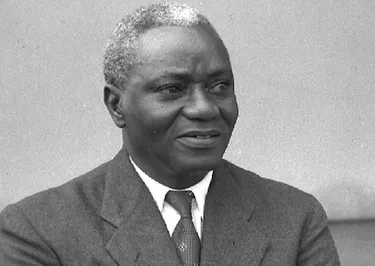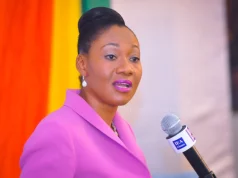This August 4th, 2024 marks the Seventy-seventh anniversary of the death of Joseph Kyeretwie Danquah, popularly known as J. B. Danquah, at the Nsawam Maximum Prisons. He died on February 4, 1965. His arrest and detention were ordered by then President of Ghana, Dr. Kwame Nkrumah. His crime according to Nkrumah was that J. B. Danquah, was planning to subvert the Convention People’s Party (CPP) administration.
Danquah was detained twice under the Preventive Detention. His first detention occurred on October 3, 1961. He was released on June 22, 1962, but re-arrested on January 8, 1964, following an attempted assassination on Nkrumah by Police Constable Seth Ametewee. Danquah, the leading opposition leader at the time in Ghana, was accused of being involved in the plot.
He was a broad-minded man with a libertarian streak, a visionary who showed Ghana a viable alternative to a state-controlled economy and dictatorship. He was dubbed the doyen of Ghanaian politics by the Watson Commission. For modern libertarians, and the youth of this country, his story is worth remembering.
The ideas of UGCC were ridiculed and rejected by the breakaway faction, the Convention People’s Party (CPP), led by Kwame Nkrumah, a dye-in-the-wool communist. Nkrumah and his CPP would have us believe that, in foundation and substance, the classical liberal concepts about government and society were wrong or, at the very least, not fit for a country coming out of colonialism. The CPP and Nkrumah were wrong. The founders of the UGCC were right, and we should defend them mightily.
The main differences between Kwame Nkrumah and the CPP and J.B. Danquah and the UGCC revolved around their political ideologies:
Nkrumah and the CPP: Advocated for a more radical socialist approach, emphasizing political independence through communist-style mass mobilization, and equality of outcomes, in which the government would take over the means of production, and distribution, and use the expected profits to provide for further industrial and social development. His theory of Nkrumaism was nothing more than Communism clothed in so-called Scientific Socialism.
Danquah and the UGCC: wanted a minimum viable product for freedom. They insisted on a minimum set of things that most Ghanaians can agree on and work towards:
- Property rights,
- Free speech,
- The rule of law,
- Multi-party democracy,
- Evolution of power from the centre
- Individual rights and,
- Free market and free enterprise.
The disagreement is fundamental, gets to the very root of what humanity is and should be, and is the core reason Danquah and the UGCC vociferously fought the evils of the left-centred CPP. The victory of the CPP in the elections that took place before independence changed and destroyed the traditions and principles of wealth creation. CPP rule did not only obliterated the economy of the country, but it also wiped out the true essentials of good governance.
It will require many years of deliberate education and policy changes to reset Ghana’s economic recovery and development path. How long it will take to recover from this arrested development and the cardinal principles of limited, virtuous government is inconceivable. The 1992 Constitution and the current crop of politicians are certainly not pointing us in that direction, nor is any other system without the rule of law, the guaranteed rights of the people to their properties, and good governance. We are literally fighting for Ghana’s future against the continuous dissipation of our resources.
Any serious observer would never cease to be amazed at how relevant the words of the Founders of the UGCC are to our age and how they accurately describe current events. The UGCC was right back then; they are right today, and their words will always be relevant until the end of time. Here’s why.
We can start with the formation of the UGCC: ‘The party’s aim is to liberate the energies of the people for the growth of a property-owning democracy in this land, with right to life, freedom and justice, as the principles to which government and the laws of the land should be dedicated in order specifically to enrich life, property, and liberty of each and every citizen’. Therein lies the key to the entire Ghanaian system, envisaged by the Founders of the UGCC, which the CPP was desperate to denigrate.
Some things have led to the under-development of Ghana (and should be stopped in its tracks):
- Disregard for private property rights
Our politicians have fared badly in setting any stable, pro-market economic policy, hence the dismal growth rates which hamper growth and prosperity for the average man. Naturally, however, the people fail to see the reasons for these failures as being the poorly performing economy, and that is why simply promising free things seems such an attractive option. Our politicians almost invariably talk about policies they are clueless about. Most politicians in Ghana today are champagne socialists, they lack the insight to see the crucial necessity of property rights in any civilised economy. They do however know that they have to make the right noises to keep their supporters happy, and what’s easier than scapegoating some white farmer stereotype.
- Disregard of the rule of law
The rule of law is a fundamental principle that underpins stable societies and democratic governance. The rule of law ensures that laws are clear, predictable, consistent, accessible, and everyone is subject to the same legal standards, regardless of their position or status. It holds governments accountable and protects the rights of all citizens. However, it has become clear that politicians and members of government do not hesitate to ignore and get away with trampling the legal system, and the judicial branch. If we allow politicians to trample on the law, everything falls apart.
- The looming inevitable fiscal crisis
The sums do not add up.
For a start, Ghana has not been able to balance the budget for a very long time, since doing so (under the current political and economic philosophy) would require a robust economy showing organic growth. Despite the rhetoric, the Ghanaian economy is not growing and, certainly would not be growing soon with current policies. Will Ghanaians take a step toward economic freedom, or will the steady decline into ever-larger government overreach continue?
The Founders of the UGCC knew that transferring income from the rich to the poor, from one government to another is not feasible. Wealth creation should be focused on the people, rather than the actions of government. Current development policies deny these principles, and we see what they have done to our economy (and are still doing today).
The Founders of the UGCC knew and believed in liberty and development in freedom and wanted Ghana established on those principles. But it seems both major parties are turning away from the system that can make Ghana a successful economy. On the one side, we find the old leftist rejection of free enterprise; on the other, a new national hostility to free trade. Both major parties are wedded to deficit-funded spending.
We must remind ourselves of some basic truths: Free market capitalism creates wealth and saves lives. Socialism and protectionism always fail. By a large margin, the free market is the most successful weapon against poverty ever, and it will continue to lift up the poor if we allow it. History, as always, instructs us.
The economic collectivism the CPP established and copied by successive regimes put roadblocks that repressed individual citizens from creating wealth and reaching their potential. While several candidates on the campaign trail promise more government intervention, like every election cycle, the 2024 elections come down to economics. Strengthening the Ghanaian economy is indeed voters’ top policy priority in 2024. And that has nothing to do with vice presidential picks or infrastructure; it has everything to do with the pocketbook, the most bipartisan issue presently.
The most powerful testament to the free market’s positive impact lies in the lives of the teeming millions in the informal economy who struggle daily to put food on the table and send their kids to school without any government intervention. From small-scale manufacturing to commerce, ordinary people have fought the odds to launch and expand small businesses, creating jobs where the government could not and offering prosperity that had never existed before in their localities.
Critics of free market capitalism may want to ignore the evidence, but those who believe in individual initiative can never forget it. There are too many human stories to ignore, and there is no better time to tell them than now.
Let us be clear: Ghana can either have a civilized, free-market industrialized economy or a centralized, politicized, socialist government. It cannot have both. Whether you trust in hearsay or empirical evidence, there is no better policy than economic freedom. We have reached a point where political correctness, false activism, and an obsession with political solutions fail. What we need are real solutions to real problems.









































